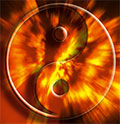------------------------
[PLEASE BE PATIENT. THIS WEBSITE IS VERY MUCH UNDER CONSTRUCTION. I'LL BE ADDING NEW CONTENT REGULARLY.]
-----------------------------
I BELIEVE
Any system of belief, be it scientific, religious, philosophical, or personal requires a certain number of fundaments on which the rest of the system is based. Those most basic statements are accepted without proof. They are arrived at, not through reasoning, but through some other process. Then the rest of the system is constructed from those statements through the use of reason. In science these fundamental statements are known as axioms or postulates. The postulates of religion are known as faith.
How one decides which postulates are "correct" is another discussion but I would postulate that the best postulate is one which best reflects absolute truth and that the best postulates can only be arrived at intuitively.
In logic, or science, fewer axioms is a good thing. This is why the Grand Unified Theory is the holy grail of the scientific community. It would bring the forces of gravity and electricity/magnetism within the scope of a single equation and thereby reduce the number of axioms required to explain the physical universe. The underlying assumption is that, by reducing the number of axioms, we bring science closer to absolute truth. (The wise scientist understands that science is metaphor for truth not truth itself.)
I believe that scientists have it right, that a better system of belief is one that requires fewer postulates. This is as true in the spiritual arena as it is in the scientific one. My criticism of the world's religions is that they require vast numbers of postulates, enough to fill books! They require, as a condition of membership, a great deal of faith in statements that pertain not just to the fundamentals of life but extend to the minutia as well. Through overemphasis on faith they diverge from truth. They become hostile to competing systems of belief and hostile to reason itself. If mankind is to find truth, the established religions must evolve or be abandoned altogether.
In the interest of truth I present a summary of my belief system. I call it the Grand Unified Perspective because it minimizes the need for postulates and unifies the fields of science, spirituality, philosophy, and psychology which are unnaturally segregated by the predominant conventional perspectives.
Here, I make no attempt to establish a rigorous logic system with postulates and derived proofs. What I do attempt to do is to start from the most fundamental statements, you might call them definitions, and then move towards statements that reflect the consequences of those definitions. Ideas introduced here are to be fleshed out in the rest of the website.
My Belief System Starts With the Following Statements
- I believe that God is all underlying principle that governs all phenomenon. It seems self evident that the order that we observe in the universe belies an underlying governance. From the mind's point of view, then, we can split the universe into two, the manifest and the un-manifest, stuff and rules, phenomenon and principle, heaven and earth.
- Therefore God is not of this world. God is not a he, she, or it. God is not a thing. God is no-thing. God is the un-manifest. God is all potential. God is the source of all things.
- I believe that every thing manifest has essence. Essence or spirit is that which gives a thing its thing-ness. Spirit, collectively, is God.
- I believe that consciousness is a bridge between spirit and the manifest. Consciousness is the animating force. Consciousness is the witness of phenomenon. Consciousness forms a perspective, a point of view. Consciousness experiences. All things have some level of consciousness.
- I believe that I am both manifest and un-manifest. "I" am a body and a mind and the underlying spirit that governs body and mind. My essence is an aspect of God. "I" am a point of enabling for the action of consciousness.
- I believe that mind is that part of the manifest self that thinks. Thinking is the manipulation of symbol, analogy, and metaphor. The accumulation of experience in the form of metaphor is knowledge. This metaphor based knowledge resides in the mind.
- I believe that there is one ultimate truth otherwise known as God. Because this truth is unmanifest and the mind is a manifest thing, mind can not know truth. God can not be an object of knowledge because God is not an object. Ultimate truth (God) is experienced through the action of consciousness.
- God, therefore is available to everyone, through direct experience, when the mind is quiet. One can not have a spiritual experience without quieting the mind. Magically, a spiritual experience is inevitable when the mind is quiet.
- Consequently, no religion has exclusive rights to ultimate truth. Any exclusivity claimed by religion is false and inherently destructive.
- Because God governs all phenomenon, then God governs every moment of my daily experience just as God governs the creation of galaxies. I am no more or less important than the milky way galaxy. I am no more or less holy than Jesus or the Buddha.
- Jesus and the Buddha were ordinary people who, extraordinarily, became fully awake to their spiritual nature. They were enlightened. We are all capable of this awakening, call it Christ or Buddha consciousness. Even in our mind dominated state, we all experience some level of Buddha consciousness. This is how we know right from wrong and why we are compelled, some more than others, to act morally.
- Spirituality is the search for spirit (underlying principle) indirectly through symbolic thought and directly through conscious experience.
- A rich spiritual life is necessary for human health.
- Philosophy is "a search for the underlying causes and principles of reality …… through logical reasoning rather than factual observation". Philosophy, therefore, is an aspect of spirituality.
- Science is the development of metaphors or models that allow us to predict physical phenomenon. Science isn't truth itself but a system of signposts pointing to the truth. For example, the essence of light is neither particle nor wave but some truth the mind can not know, but consciousness can easily experience. At any point in history, "scientific truth" is the metaphor which proves most useful. Because science is the identification of principle, science is an aspect of spirituality.
- Psychology is the science of the mind. It's an attempt by the mind to model "mindness" (the essence of mind). Mindness is an aspect of God therefore psychology is an aspect of spirituality.
- In engineering school, I was studying an aspect of God, that aspect that governs physical phenomenon.
- Religions, for the most part, are institutionalized belief systems tragically mistaken for truth. Letters are symbols. Words are symbols composed of symbols. Literature is the use of words to evoke images and metaphor in the mind. How then, can ancient writings be absolute truth? Truth is no-thing so religious teachings, at best, are signposts pointing to truth. Religious teachings are mythologies. A religion ought to be a particular style of spirituality that incorporates traditions that suit a particular culture, ethnicity, or personality.
- Myth is to the human experience what science is to physical phenomenon. Mythologies (including religious teachings) are signposts pointing towards the truth of humanness. Myth is metaphor that has poured forth from the depths of the collective human consciousness. That the conventional perspective considers "myth" a synonym for "false", is a measure of just how spiritually barren we have become.
- The word "intelligence" implies consciousness and mind. God contains the potential for and is the source of consciousness and mind, therefore, God is most certainly intelligent.
- Evolution is the scientific term for the way in which life forms change over time. The principles involved in evolution have transformed simple life forms into complex ones. As evolution is the working of principle then evolution is the working of God. Evolution is an aspect of God. Evolution has created intelligence and so one could say that evolution is intelligent design.
- If "randomness" is an aspect of evolution it is because randomness is an aspect of God. If randomness participates in creating complex life forms then I would declare that randomness is highly meaningful.




